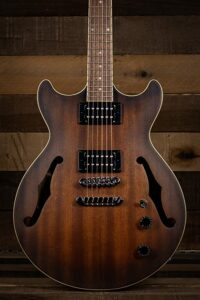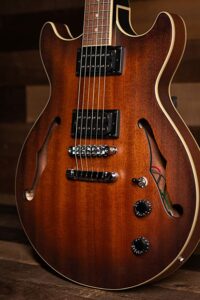Lead guitar refers to a musical part of a guitar where a guitarist plays instrumental fill passages, melody lines, guitar solos, etc. within the song structure. In a rhythm guitar, you have to hold down the chords with one hand and strum rhythmically with another hand. Here, we will discuss lead vs rhythm guitar in great detail.
If you are a beginner, you might wonder about the possible differences between rhythm and lead guitar. Let’s dive right in!
Lead vs rhythm guitar
Rhythm guitar concentrates on playing riffs and chords in a way that forms the ultimate backbone of music. It is certainly different from a lead guitar, which focuses on solos and melodies to play. Below listed are a few examples of what a rhythm guitarist can play:
- Fingerpicking chord progressions
- Strumming chord progressions
- Playing low-end riffs
- Strumming power chords
Now you can compare this list of things with which a lead guitarist may play:
- Add high-end melodies or licks throughout a song
- Play all the solos in one song
- Harmonize with the vocal lines
You can notice that the primary difference between lead and rhythm guitar is that the lead guitar tries to focus on adding melody to the music. On the other hand, rhythm guitar concentrates on driving particular music.
You need to know various techniques for playing lead or rhythm guitar. But there actually is a good amount of overlapping between these two playing styles. There is a prominent difference between lead and rhythm guitar in a few styles of music. For example, in classical music, the lines between rhythm and lead guitar playing are made blurry.
A classical guitar concentrates on mixing the skills of lead and rhythm guitar. So it is not right for us to call any classical guitarist a lead a rhythm guitarist.
Lead vs rhythm guitar difficulty
It is never an easy answer when you compare how much harder is one than the other to play. In songs, numerous easy progressions (rhythm) of the strumming chords are used. But you will also find a bit difficult strumming progression which can be very challenging even for advanced guitarists.
Easy solos (lead) are also there which most beginners can learn. Also, some solos are very complicated and can only be played by the virtuoso top guitarists.
While numerous skills need to be learned for playing lead guitar, plenty of difficult rhythm guitar parts are also there which can be exactly as hard to acquire as one complicated solo. The key point that one must remember is that one can find both lead and rhythm guitar difficult or easy, depending upon what exactly one wants to play.
Some people have an easy experience while learning rhythm guitar, while others may find lead guitar easier to learn.
Lead or rhythm guitar: Which one should you learn first?
If you are standing on the threshold of learning guitar, you may wonder which guitar should you learn first: lead or rhythm.
According to me, the best approach can be by starting to learning rhythm guitar. Learning this guitar can build your fundamental skills which will prove to be very important for any style you want to play. Even if you are interested to play a lead guitar, first make yourself comfortable with learning rhythm guitar.
The benefits of learning rhythm guitar are it builds important timing skills, is easier, and helps you choose your own path.
FAQs
-
What is the job of a rhythm guitarist?
Rhythm guitarists generally try to generate a very strong chordal and rhythmic sound. Unlike a lead guitarist, whose goal revolves around producing a high-pitched, sustained melody line that listeners can clearly hear over every other sound. As a result, lead and rhythm players are seen to be using different amplifiers and guitars.
-
Are riffs rhythm or lead?
This question can be answered in two sections. At first, lead and rhythm guitar sound differently as they play two different roles in a band. Secondly, whereas lead guitarists attempt to play individual riffs and notes, rhythm guitarists try to play the chords.

Hi, I am William. I am a music enthusiast. I play the guitar and ukulele. I like to try out all instruments and review them, to help others make an informed decision. You must choose the right instrument to get that sweet sound you desire. When I am not on my instruments I will be found reading or cooking.







